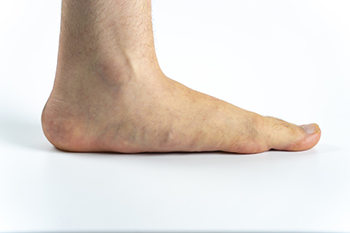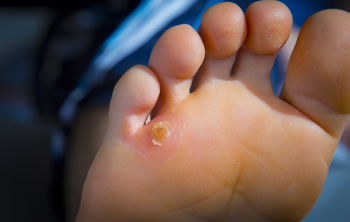

Parents can have differing opinions when it comes to their children walking barefoot. Their reasons can range from the child preventing a foot injury when the shoes are kept on to children possibly having a heightened sense of their environment while walking barefoot outdoors. Recent studies have shown that waking barefoot may benefit the brain and nervous system and this may result from the child being more conscious of their surroundings. An additional benefit can be improved balance due to the feet getting accustomed to walking on various surfaces. Frequently wearing shoes may inhibit the natural toe spread and may gradually lead to sustaining a foot injury. Falling episodes may be reduced when the lower legs and feet are strengthened by walking barefoot. If you have questions about your child’s foot development, please confer with a podiatrist who can confirm if walking barefoot is good for their overall development.
Making sure that your children maintain good foot health is very important as they grow. If you have any questions, contact Dr. Harris L. Klear of Burlington County Podiatry Associates. Our doctor can provide the care you need to keep you pain-free and on your feet.
Keeping Children's Feet Healthy
Having healthy feet during childhood can help prevent medical problems later in life, namely in the back and legs. As children grow, their feet require different types of care. Here are some things to consider...
Although babies do not walk yet, it is still very important to take care of their feet.
Avoid putting tight shoes or socks on his or her feet.
Allow the baby to stretch and kick his or her feet to feel comfortable.
As a toddler, kids are now on the move and begin to develop differently. At this age, toddlers are getting a feel for walking, so don’t be alarmed if your toddler is unsteady or ‘walks funny’.
As your child gets older, it is important to teach them how to take care of their feet.
Show them proper hygiene to prevent infections such as fungus.
Be watchful for any pain or injury.
Have all injuries checked by a doctor as soon as possible.
Comfortable, protective shoes should always be worn, especially at play.
If you have any questions please feel free to contact one of our offices located in Marlton and Delran, NJ . We offer the newest diagnostic and treatment technologies for all your foot and ankle needs.

Flat feet are a common condition of the foot that does not have an arch or some elevation in the middle of the forefoot. They can develop in people of all ages and genders. Flat feet can result in tired feet as well as foot and ankle pain. Feet can swell and the Achilles tendon can get damaged from excessive pressure on the foot. Bunions can also form. Flat feet can be a result of ill-fitting shoes, wearing the wrong types of shoes for too long, swollen feet, gait changes, genetics, obesity, and certain medical conditions like rheumatoid arthritis. If you put your feet on the ground and they are flush with the floor, you likely have flat feet. If you have foot pain or want to prevent problems that can occur from flat feet, see a podiatrist who can help with shoe suggestions, orthotics, and other treatment options.
Flatfoot is a condition many people suffer from. If you have flat feet, contact Dr. Harris L. Klear from Burlington County Podiatry Associates. Our doctor will treat your foot and ankle needs.
What Are Flat Feet?
Flatfoot is a condition in which the arch of the foot is depressed and the sole of the foot is almost completely in contact with the ground. About 20-30% of the population generally has flat feet because their arches never formed during growth.
Conditions & Problems:
Having flat feet makes it difficult to run or walk because of the stress placed on the ankles.
Alignment – The general alignment of your legs can be disrupted, because the ankles move inward which can cause major discomfort.
Knees – If you have complications with your knees, flat feet can be a contributor to arthritis in that area.
Symptoms
Treatment
If you are experiencing pain and stress on the foot you may weaken the posterior tibial tendon, which runs around the inside of the ankle.
If you have any questions please feel free to contact one of our offices located in Marlton and Delran, NJ . We offer the newest diagnostic and treatment technologies for all your foot and ankle needs.

Repeated pressure on the posterior tibial nerve is often the reason for the foot condition known as tarsal tunnel syndrome. This nerve is located inside the tarsal tunnel that is found near the ankle. Tarsal tunnel syndrome can occur when the nerve becomes inflamed. It can happen to people who have flat feet, diabetes, or who have endured an ankle sprain. The symptoms that patients can experience can consist of a burning sensation, a feeling of pins and needles, or may feel like an electric shock. The treatment for this condition can vary from wearing braces or splints to having surgery, and this depends on the severity of the ailment. Custom-made orthotics may be worn to alleviate some of the pressure from this syndrome. If you have this foot condition, it is strongly urged that you contact a podiatrist who can determine why you have it and choose the best treatment option for you.
Tarsal tunnel syndrome can be very uncomfortable to live with. If you are experiencing tarsal tunnel syndrome, contact Dr. Harris L. Klear of Burlington County Podiatry Associates. Our doctor can provide the care you need to keep you pain-free and on your feet.
Tarsal Tunnel Syndrome
Tarsal tunnel syndrome, which can also be called tibial nerve dysfunction, is an uncommon condition of misfiring peripheral nerves in the foot. The tibial nerve is the peripheral nerve in the leg responsible for sensation and movement of the foot and calf muscles. In tarsal tunnel syndrome, the tibial nerve is damaged, causing problems with movement and feeling in the foot of the affected leg.
Common Cause of Tarsal Tunnel Syndrome
The Effects of Tarsal Tunnel Syndrome
A physical exam of the leg can help identify the presence of tarsal tunnel syndrome. Medical tests, such as a nerve biopsy, are also used to diagnose the condition. Patients may receive physical therapy and prescriptive medication. In extreme cases, some may require surgery.
If you have any questions please feel free to contact one of our offices located in Marlton and Delran, NJ . We offer the newest diagnostic and treatment technologies for all your foot and ankle needs.

A corn is a small area of skin that hardens to protect the skin from excessive pressure that gradually forms on the foot from friction. This friction comes from wearing shoes or socks that do not fit correctly. A common place for a corn to develop is the side of the pinky toe. As small as it is, it can be extremely painful, and may make completing daily activities difficult to do. Additional reasons why a corn can appear may include standing for long periods of time, or if the feet are constantly sweaty. Corns that are found between the toes are referred to as soft corns, and are so named for the moisture that is found there. Seed corns develop on the soles of the feet, and are often found in clusters. Temporary relief may be found when a protective covering is worn over the corn, until a podiatrist is contacted. This is the type of doctor who can determine what the best course of treatment is, which may include surgery for permanent removal. If you have a corn on your foot, please consult with a podiatrist as quickly as possible who can effectively evaluate and treat the condition.
Corns can make walking very painful and should be treated immediately. If you have questions regarding your feet and ankles, contact Dr. Harris L. Klear of Burlington County Podiatry Associates. Our doctor will treat your foot and ankle needs.
Corns: What Are They? And How Do You Get Rid of Them?
Corns are thickened areas on the skin that can become painful. They are caused by excessive pressure and friction on the skin. Corns press into the deeper layers of the skin and are usually round in shape.
Ways to Prevent Corns
There are many ways to get rid of painful corns such as:
Treating Corns
Although most corns slowly disappear when the friction or pressure stops, this isn’t always the case. Consult with your podiatrist to determine the best treatment option for your case of corns.
If you have any questions please feel free to contact one of our offices located in Marlton and Delran, NJ . We offer the newest diagnostic and treatment technologies for all your foot and ankle needs.